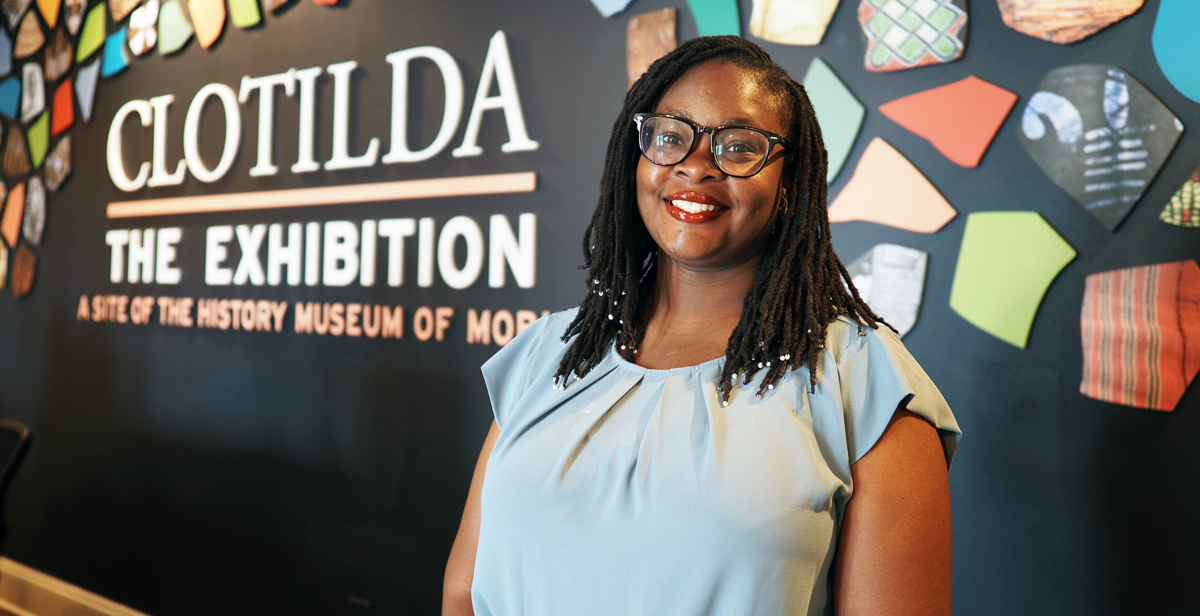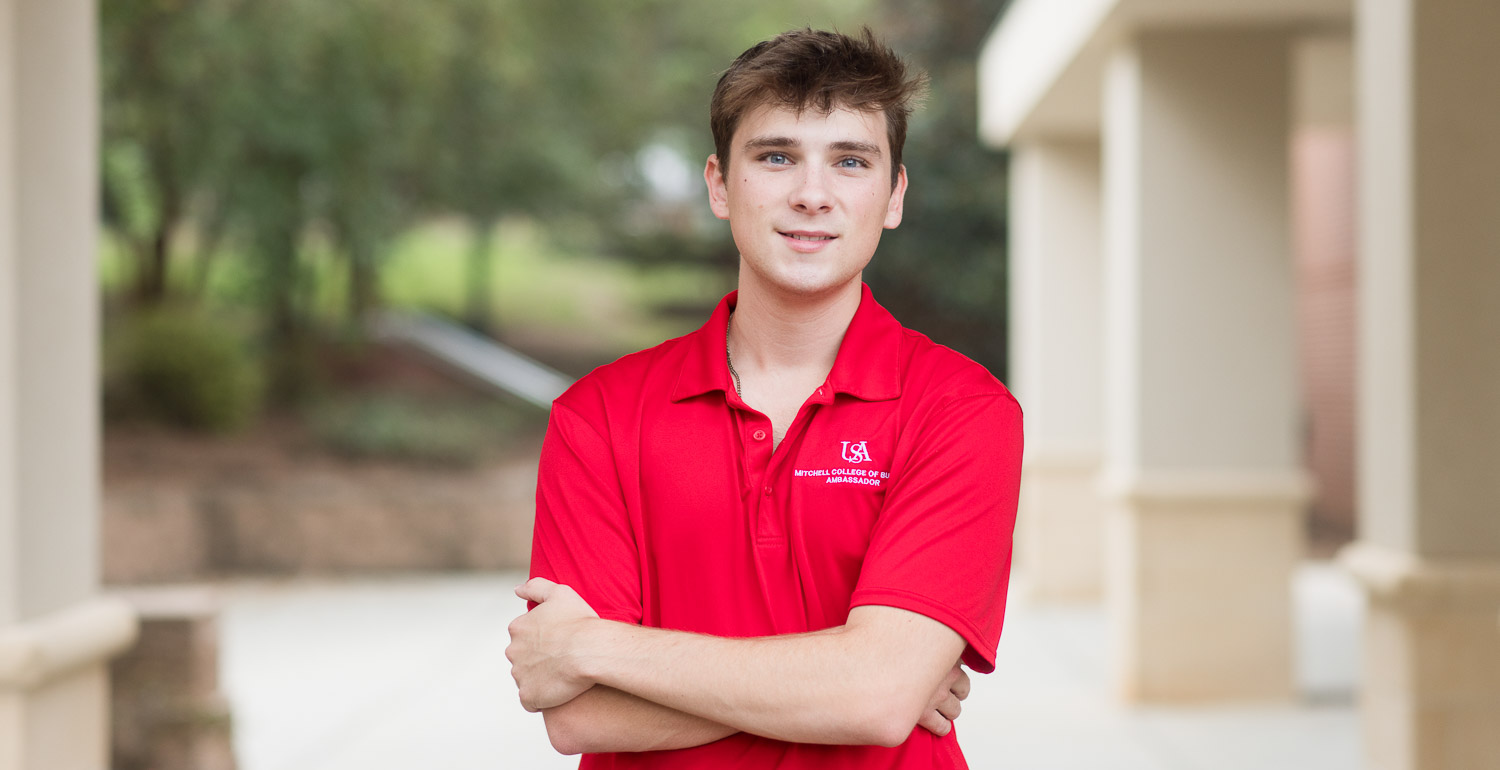South Graduate Manages New Africatown Heritage House
Posted on July 13, 2023

During a quiet moment at the Africatown Heritage House, Jessica Fairley describes hectic months of deadlines, drawbacks and the 1,001 details that led to the opening of the museum on Saturday.
It sounds like she loved every minute — except for those minutes that turned into hours struggling with Internet connections.
“I come from a journalism background, so it’s go-go-go,” said Fairley, manager of the museum and a communication graduate from the University of South Alabama. “When I started, day one, it was off to the races. This building was just a building; there was nothing on the walls. But everything on my roadmap to do before we opened, I got done.”
The Heritage House opened with “Clotilda: The Exhibition,” which tells the story of the 110 enslaved men, women and children aboard the last slave ship to reach the United States in 1860. Many of them helped build the community of Africatown just north of Mobile. They included Cudjoe Lewis, the last survivor of the Clotilda, who was written about by author Zora Neale Hurston in “Barracoon,” which wasn’t published until 2018 — the same year that remains of the ship were discovered in the Mobile-Tensaw Delta.
Fairley grew up in nearby Prichard, so she was familiar with the story.
Her best friend at Vigor High School was Angela Davis, who was a member of a Clotilda family. Angela’s sister, Joycelyn Davis, became a community activist featured in the 2022 Africatown documentary, “Descendent,” which was co-produced by Dr. Kern Jackson, director of the African American Studies Program at South.
It was Davis who urged her to apply for manager of the Heritage House.
After graduating from South in 2008, Fairley had worked as a TV news reporter, editor and producer in Mobile and Albany, Georgia. At Albany State University, she became TV production coordinator. At Valdosta State University, she earned a master’s degree in communication arts.
Dr. Meg McCrummen Fowler, director of the History Museum of Mobile, which operates the Heritage House, was looking for a day-to-day manager and more. She needed someone who could promote the 5,000-square-foot museum and expand research in the community.
“Jessica was an excellent choice,” Fowler said. “She started May 1. One of the things that made her such a strong candidate was her production background. One of the places we really want to grow is in oral history. Her ability to help connect with that is something that made her stand out.”
In Africatown, the new Heritage House stands out. Colorful banners promote the “Clotilda” exhibit. Signs lead visitors from Interstate 165 to the museum, at 2465 Wimbush St., in a residential neighborhood next to the Hope Community Center.
The museum is open from 10 a.m. to 5 p.m., Tuesday through Saturday. Tours begin every 20 minutes. Admission is free for residents of Mobile County; visitor admission is $15, $9 for seniors and military, $8 for students.
Connections in the Community
Fairley spent much of her childhood living with her grandmother. Her family was poor, but her father always told her she could become anything she wanted to be. She says that gave her confidence.
In school, she made good grades. A high school teacher admired her writing and said she should study communication. She enrolled at South and became the first member of her family to graduate from college.
While at South, Fairley worked as a student aide at the Mobile office for the Army Corps of Engineers. She jokes that she walked in as a little girl with a ponytail, and walked out as a young woman in a business suit.
“That job took me right through college,” she said. “I had a real job while I was in college.”
Women who worked at the Corps of Engineers office suggested that Fairley join Alpha Kappa Alpha, the first African American sorority in the United States. She wound up becoming vice president of the South chapter.
Nearly 20 years later, several of her AKA sorority sisters volunteered to work at the grand opening of the Africatown Heritage House. One of the guests at the opening reception was Curtis Flakes, the retired head of the planning division at the Corps of Engineers.
“I told him that I still remembered some of the things he told me over the years,” Fairley said. “Just little things that meant something to me.”
In the Department of Communication at South, Fairley learned to write news and meet deadlines. Useful skills for both TV journalists and museum managers.
“All of my communication background, it comes from South,” she said. “My technology background, that came from South. I wouldn’t be here if it wasn’t for South.”
Fairley’s first-ever television appearance came in a student commercial promoting the University.
“I think I said, ‘South Alabama is the way to be,’” she said, laughing. “Something like that.”
The $1.3 million Africatown Heritage House is a result of a collaboration between the Mobile County Commission, the city of Mobile, local and state arts groups and community organizations. Outside the museum stands a sculpture, “The Memory Keeper,” a collaboration by Charles Smith and Frank Ledbetter, along with a healing garden planted with herbs.
The museum building is painted a deep ocean blue. It matches the trim of the Mobile County Training School across the street. It also symbolizes the sea crossed by more than 12 million Africans trapped in the transatlantic slave trade.
Visitors to the “Clotilda” exhibit are given an audio guide that describes what they’re seeing. There are sections on the history of Cudjoe Lewis in Africa and America, the growth of Africatown, and the discovery of the ship that was burned and sunk in the delta. A “tank room” shows fragile wooden artifacts from the Clotilda that are preserved in water.
A gift shop in the lobby features books and crafts about Africatown and the African American experience. Fairley is proud of the program that allows local artists and businesses to keep 90 percent of the proceeds from their work.
Having managed the opening of the museum, Fairley is working on a docent program of local residents. The part-time jobs will pay $15 an hour. Who better to tell the story of Africatown than the people of Africatown?
“We want to take it past oral histories,” Fairley said. “We want to do documentaries. We want people here to tell their stories.”



